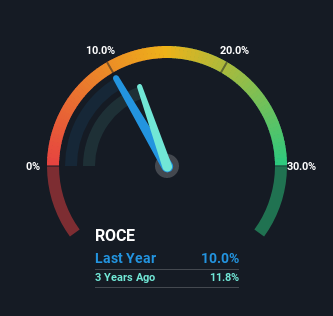Returns On Capital Signal Tricky Times Ahead For Cambridge Technology Enterprises (NSE:CTE)
Did you know there are some financial metrics that can provide clues of a potential multi-bagger? Firstly, we'll want to see a proven return on capital employed (ROCE) that is increasing, and secondly, an expanding base of capital employed. Ultimately, this demonstrates that it's a business that is reinvesting profits at increasing rates of return. However, after investigating Cambridge Technology Enterprises (NSE:CTE), we don't think it's current trends fit the mold of a multi-bagger.
Return On Capital Employed (ROCE): What Is It?
Just to clarify if you're unsure, ROCE is a metric for evaluating how much pre-tax income (in percentage terms) a company earns on the capital invested in its business. To calculate this metric for Cambridge Technology Enterprises, this is the formula:
Return on Capital Employed = Earnings Before Interest and Tax (EBIT) ÷ (Total Assets - Current Liabilities)
0.10 = ₹128m ÷ (₹1.6b - ₹303m) (Based on the trailing twelve months to December 2022).
So, Cambridge Technology Enterprises has an ROCE of 10.0%. Ultimately, that's a low return and it under-performs the IT industry average of 13%.
Check out our latest analysis for Cambridge Technology Enterprises

Historical performance is a great place to start when researching a stock so above you can see the gauge for Cambridge Technology Enterprises' ROCE against it's prior returns. If you're interested in investigating Cambridge Technology Enterprises' past further, check out this free graph of past earnings, revenue and cash flow.
What Can We Tell From Cambridge Technology Enterprises' ROCE Trend?
On the surface, the trend of ROCE at Cambridge Technology Enterprises doesn't inspire confidence. Over the last five years, returns on capital have decreased to 10.0% from 31% five years ago. However, given capital employed and revenue have both increased it appears that the business is currently pursuing growth, at the consequence of short term returns. If these investments prove successful, this can bode very well for long term stock performance.
On a side note, Cambridge Technology Enterprises has done well to pay down its current liabilities to 19% of total assets. So we could link some of this to the decrease in ROCE. Effectively this means their suppliers or short-term creditors are funding less of the business, which reduces some elements of risk. Some would claim this reduces the business' efficiency at generating ROCE since it is now funding more of the operations with its own money.
The Key Takeaway
Even though returns on capital have fallen in the short term, we find it promising that revenue and capital employed have both increased for Cambridge Technology Enterprises. These trends don't appear to have influenced returns though, because the total return from the stock has been mostly flat over the last five years. So we think it'd be worthwhile to look further into this stock given the trends look encouraging.
Cambridge Technology Enterprises does come with some risks though, we found 3 warning signs in our investment analysis, and 1 of those can't be ignored...
While Cambridge Technology Enterprises isn't earning the highest return, check out this free list of companies that are earning high returns on equity with solid balance sheets.
New: AI Stock Screener & Alerts
Our new AI Stock Screener scans the market every day to uncover opportunities.
• Dividend Powerhouses (3%+ Yield)
• Undervalued Small Caps with Insider Buying
• High growth Tech and AI Companies
Or build your own from over 50 metrics.
Have feedback on this article? Concerned about the content? Get in touch with us directly. Alternatively, email editorial-team (at) simplywallst.com.
This article by Simply Wall St is general in nature. We provide commentary based on historical data and analyst forecasts only using an unbiased methodology and our articles are not intended to be financial advice. It does not constitute a recommendation to buy or sell any stock, and does not take account of your objectives, or your financial situation. We aim to bring you long-term focused analysis driven by fundamental data. Note that our analysis may not factor in the latest price-sensitive company announcements or qualitative material. Simply Wall St has no position in any stocks mentioned.
About NSEI:CTE
Cambridge Technology Enterprises
A business and technology services company, provides IT solutions to enterprise services in India, the United States, the Middle East, and internationally.
Good value with slight risk.
Similar Companies
Market Insights
Community Narratives




